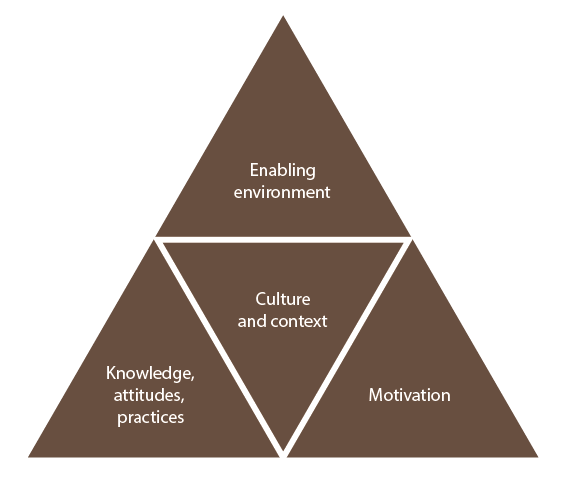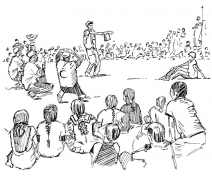43. Social mobilization and behaviour change
Overview
There are many reasons why people practise unhealthy behaviours. People are affected by access to services or facilities, social norms and influences where they work, live or play. Behaviour change is the study of how and why people change some habit or action in their life. As volunteers, we need to understand WHY the behaviour is happening and WHAT actions will lead to change to create healthy behaviours. Examples of healthy behaviours include handwashing, breastfeeding, immunizations, consistent condom use and use of bed nets.
In any culture and context, behaviour change involves three elements. Before people will change their behaviour:
- They need to know what, why and how they should change. They need knowledge.
- They need to have the right equipment, access and capacity. They need an enabling environment.
- They need to be motivated to change.

The social-ecological model below shows how each person's behaviours are affected by many different levels of influence including the individual level, the interpersonal level, the community level, the organizational level and the broader policy level which includes laws and policies that allow or restrict a behaviour. In order to promote health, it is important to consider and plan behaviour change activities across multiple levels at the same time. This approach is more likely to result in successful behaviour change over time. As a volunteer, it is helpful to understand that behaviour change is difficult for many people because of these many levels and the complex interactions and expectations across the different levels. If you consider how each of the levels affects the behaviour of the person you want to help, you can try different interventions at each level that is specific to their needs.

What do to and how to do it
The general process for developing a behaviour change intervention includes staff and volunteers working through the general steps of:
- Sensitizing the community to the behaviour change process using the theory of change model.
- Assessing the problem behaviour – why it is practised, who practises it, when it is practised and what factors in the environment or society encourage the behaviour. Assess this information at the different levels of the social-ecological model for each community you serve.
- Identifying an appropriate behaviour goal based on your assessment.
- Reviewing the causes or barriers at each level that allow the behaviour to continue. Identify interventions that align with each cause or barrier and that can be used at different levels.
- Discussing the suggested interventions for each social-ecological model level with the community.
- Identifying appropriate interventions for the context at each level. Interventions should be planned to address the stages of the theory of change by first giving knowledge and addressing environmental factors, motivating key people to gain approval and intentions, and ultimately inciting people to action that contributes to the overall goal.
- Implementing the interventions at each level.
- Monitoring to see if change is happening. Change takes time but it must be monitored to ensure that it is happening, even slowly. Additionally, as people go through the change process, their barriers and causes will change. The behaviour change interventions should adjust to these changes to ensure that change can continue.
- Recognizing that when change is not happening as intended, further assessment and intervention tweaking is needed.
- Continuing to implement, monitor, assess and adjust as the change process happens.
For more information, please consult the eCBHFA Manual for volunteers on Behaviour Change, including:
- Principles of behaviour change
- The social ecological model
- The stages of behaviour change
- Activities for behaviour change
